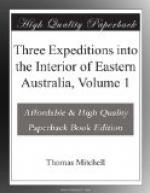June 9.
Striking again into the original south-west track by leaving the river on a bearing of 202 degrees we arrived on the eastern bend of it, where we had before breakfasted, and where we now heard natives, as if hastily making their escape. Continuing the journey to the next bend lower down we encamped at the head of the same gully in which I slept on the night between the 4th and 5th of June.
NEW ACACIA.
On passing through the bush this day we fell in with a tree that was new to me. It appeared to be very near Acacia eglandulosa (De C.) but the branches had so graceful a character that I was tempted to draw it while I awaited the arrival of the carts, whose progress through the spinous scrub already mentioned was very slow. The wood of this acacia was hard and of a dark brown colour. We gathered some stones of the fruit: and we brought away its stem also.
June 10.
The knowledge which I had acquired in my ride down the Darling now enabled me to follow the most desirable route in order to avoid the scrub, and travel along the plains near its banks. At five miles and twelve chains we approached a bend of the river, and found there the remains of a large hut, in the construction of which an axe had been used. It therefore occurred to me that we might be near the tree where Captain Sturt had turned from the Darling, and I found that the northern head of D’Urban’s group bore nearly 58 degrees East of South, the bearing given by him of this group.
MR. HUME’S TREE FOUND.
I therefore looked along the riverbank for the tree in question, but without success. In crossing a dry watercourse some miles further on it occurred to me that this might be the one at the mouth of which Mr. Hume had cut his name. I therefore sent overseer Burnett and The Doctor to trace the channel down, and to look for a tree so marked. They found at the mouth of the creek a very large and remarkable gumtree, and on the side next the river the letters H.H. appeared, although the cross-line of one H had grown out. The letters seemed to have been cut with a tomahawk, and were about five inches in length. The men cut my initials also on that tree, which to my regret I was prevented from seeing by a desire to attain a certain point with the party which I was consequently obliged to lead. We travelled for this purpose until after sunset, and then encamped at a distance of about a mile and a half to the southward of a bend of the Darling.
CATARACT IN THE DARLING.
Here the river formed a cataract of about two feet, falling over some argillaceous ironstone: and as the waters glittered in the moonlight I listened with awe to the unwonted murmur of this mysterious stream which poured through the heart of a desert, by its single channel, that element so essential to the existence of all animals. One of the men (Robert Whiting) had examined the river a mile and a half above the fall, and found the water there so very salt that he could not drink it, and he therefore proceeded downwards to this fall, where it proved to be good.




